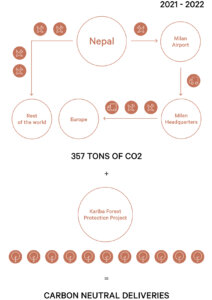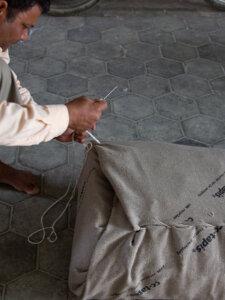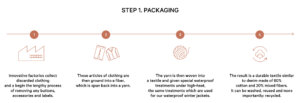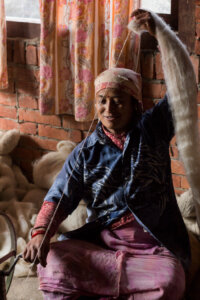-
01 CARBON NEUTRAL DELIVERIES

cc-tapis begins it’s journey to becoming carbon neutral.
Following it’s sustainable production processes, cc-tapis has had to consider more than just how their rugs are made and begin to ask how they arrive to the loving homes of their clients. This question was answered by the development of plastic free packaging in 2021 and from 2022: carbon neutral deliveries across the globe.
To assess current emissions, cc-tapis teamed-up with an external consultancy firm: Carbonsink, an organization specialized in measuring environmental footprints, working with their clients to develop climate strategies and projects which generate high-quality carbon credits to offset emissions.
cc-tapis and Carbonsink studied the journey a cc-tapis rug or sample will take to arrive to the final client, taking into consideration distances and transportation modes. These factors were added together to calculate the amount of CO2 emitted for the shipment of each rug, with the result that cc-tapis’ global shipments emitted 657 tons of CO2 in 2022.
After identifying these emissions and having implemented, as far as possible, measures to reduce emissions such as a lower frequency of flights with a greater concentration of merchandise, cc-tapis has commited to offset all remaining emissions with a certified carbon project suggested by carbonsink.
From 2022, all deliveries are offset by carbon projects.
cc-tapis chose to support Kariba Forest Protection, a community-based project in Zimbabwe. A project that protects almost 785,000 hectares of forests and wildlife on the southern shores of Lake Kariba. The Kariba Forest Protection project supports a range of activities beyond environmental protection, empowering local communities to become more resilient to the effects of a changing climate.
Discover more about the Kariba Forest Protection project here
Download the Certificate of Verified Carbon Unit (VCU) Retirement
-
02 PACKAGING
Sustainability is a long-term commitment, a commitment which entails rethinking perspectives, processes and directions. Taking advantage of the tons of clothing which are discarded every year, cc-tapis' textile packaging is made from recycled fabric, produced close to the cc-tapis Handloom Atelier in Panipat India, a world center for recycled clothing processes. As of January 2021, cc-tapis is shipping all of their rugs in this new textile worldwide, illustrating the value of recycled materials and proving their growing importance.
As of January 2021, cc-tapis is shipping all of their rugs in this new textile worldwide, illustrating the value of recycled materials and proving their growing importance.OPEN SOURCE INITIATIVES.
In 2021 cc-tapis launched it’s plastic free packaging, a waterproof textile created from recycled clothing. To comunicate this new iniative and the versatility of this textile cc-tapis wanted to illustate that the life-cycle of packaging does not necessarily end at delivery.
This iniative took shape with GRASSI 10000, a Milanese company driven by a strong sensitivity for recycling and sustainability applied to textile products. GRASSI 10000 designed and produced a shopping bag using cc-tapis’ packaging, a bag which can be reproduced by anyone who receives a cc-tapis rug, illutsrating that this new plastic free packaging can be reutized by the final consumer. GRASSI 10000 have granted access to their design which is available to download on the cc-tapis website.
“The circularity of materials is an essential message that we want to transmit to future generations, a message that is central to our NPO cc-for education”
say Nelcya Chamszadeh, Fabrizio Cantoni and Daniele Lora, the three founders of cc-tapis.
Not only is the recycled textile an ideal material for shipping and protecting rugs but in the hands of customers the versatile fabric can take on new shapes and uses.


-
03 SOCIAL SUSTAINABILITY
CC-FOR EDUCATION was founded in May 2015 by Nelcya and Fabrizio Cantoni.Embracing artisanal production techniques means embracing the artisans that create our rugs. From this CC-FOR EDUCATION was born, a non-profit organization created by the founders of cc-tapis in 2015. This small organization is dedicated to providing a private education to the children of weavers in Nepal.
Over the course of 6 years, CC-FOR EDUCATION has grown to have nearly 60 pupils in 2 private schools in Kathmandu and 1 student receiving tertiary education at the Nepal Engineering College. We hope to sponsor new students each year with the long-term vision of giving Nepal a brighter future.
-
04 PRODUCTION

cc-tapis rugs can take between 12- 16 weeks to produce, an artisanal process where each step is meticulously executed by hand, rich in culture and tradition. No synthetic materials are used, no industrial machines, no acids and no chemicals. The rugs are made the same way they have been for centuries. A process that is environmentally friendly by nature.
Click here for more information on our production
Over the past ten years, cc-tapis has been re-evaluating these ancient processes to find ways to re-utilize the materials which may be left over after the production of a rug. cc-tapis has explored how to refine and separate the natural materials in order to create palettes of natural undyed wool and silk. Processes that push both production but also the final aesthetics of our rugs. Stay tuned for more information on recycled fibres.


























